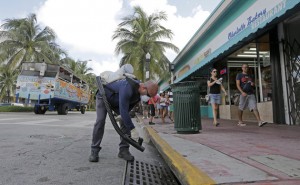Florida Finds First Local Mosquitoes With Zika Virus

Florida officials on Thursday said they have trapped the first mosquitoes that tested positive for the Zika virus in the Miami area, further confirming reports of local U.S. transmission of the illness that can cause severe birth defects.
Three mosquito samples tested positive from a small area in Miami Beach where increased trapping and intensified mosquito control measures are being implemented, the Florida Department of Agriculture and Consumer Services said.
The Florida Department of Health has said there have so far been 47 cases of Zika in people believed to have contracted the virus in a small area of Miami, but until now, the department had not found infected mosquitoes.
“This find is disappointing, but not surprising,” Commissioner of Agriculture Adam Putnam said in a statement. “Miami-Dade County, the City of Miami Beach, and state and federal partners will continue to work aggressively to prevent the spread of Zika,” Putnam added.
Now that Zika-positive mosquitoes have been identified in surveillance traps in Miami Beach, Miami-Dade County’s Mosquito Control team will continue to conduct inspections to reduce mosquito breeding and perform spray treatments as necessary in a 1/8-mile radius around the trap location, officials said.
“We are aggressively working to eliminate any and all potential mosquito breeding grounds,” Miami Beach Mayor Philip Levine said in a statement. “We need Congress to do its part to provide the necessary emergency resources to properly combat the spread of this virus.”
The U.S. Congress has failed to reach an agreement on emergency Zika funding after President Barack Obama requested $1.9 billion for mosquito control, development of vaccines and diagnostics and other efforts to combat Zika. The U.S. Centers for Disease Control and Prevention has said it is running out of funds to fight the virus.
The current Zika outbreak, first detected in Brazil last year, has rapidly spread across the Americas.
Florida officials said more than 40,000 mosquitoes had been tested since May, and that the three samples were the first to test positive.
“It means that there is a substantial amount of Zika virus in that population because it’s actually not easy to find the virus in the mosquitoes that you trap,” said Dr. William Schaffner, professor of medicine in the division of infectious diseases at Vanderbilt University School of Medicine in Nashville.
Zika infection in pregnant women can cause the rare birth defect known as microcephaly, which can lead to serious developmental problems, and has also been linked to severe fetal brain abnormalities.